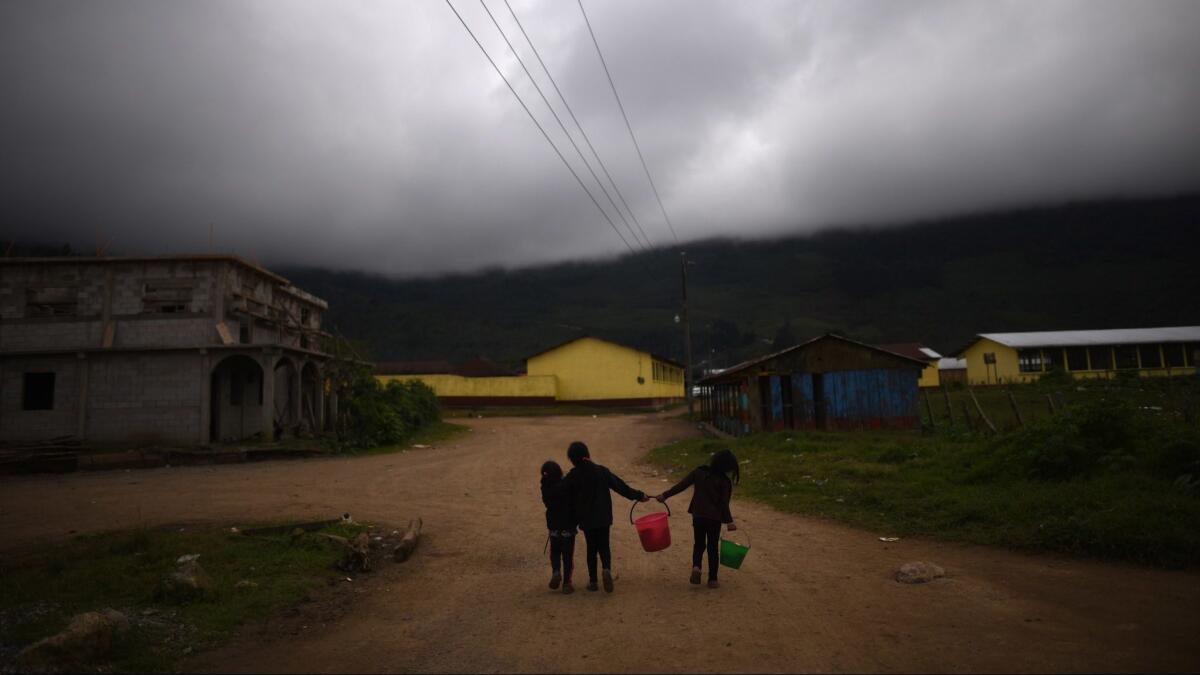Editorial: Fighting Central American corruption will help prevent migration more than any border wall

- Share via
For more than a decade the United Nations’ Commission Against Impunity in Guatemala — known by its Spanish acronym CICIG — has worked with Guatemalan prosecutors to ferret out corruption and criminal conspiracies within government as the country struggled to embrace democracy after years of disastrous civil war. That cooperative effort helped stabilize the country’s legal system and, according to a Congressional Research Service report last year, worked to “reduce the country’s rampant criminal impunity by strengthening Guatemala’s capacity to investigate and prosecute crime.”
More than 310 targets of investigations — including a former vice president — have been convicted on corruption-related charges. In addition, 60 criminal networks have been exposed, more than 1,700 corrupt police officials fired and fundamental laws governing organized crime have been improved.
CICIG’s work helped topple the presidency of Otto Perez Molina over corruption at the national taxing agency, and led to the arrest of another former president, Alvaro Colom, and nine members of his cabinet in connection with a $35-million fraud investigation involving a new bus system in Tegucigalpa, the capital. Current President Jimmy Morales, a former comedian who, much like Donald Trump, owed his public profile to television and campaigned on an anti-corruption platform, backed CICIG’s efforts until investigators ensnared his brother and son and then accused Morales himself of campaign finance violations. Morales responded by booting CICIG out of the country even though Guatemala had previously agreed to let the body keep working until next year.
If Trump sincerely believes there is a humanitarian crisis at play, then he also needs to recognize that holding up a stop sign on the border won’t resolve it.
We should all be concerned about the conditions under which our neighbors live, of course. But here’s a self-interested reason why Americans should care about what’s happening in Guatemala: Because the corruption that CICIG worked so hard to uproot is tied to the conditions that have sent so many migrants fleeing north to escape violence and economic squalor. These are the “push” factors that have created the humanitarian predicament at the U.S.-Mexico border that have become one of President Trump’s favorite talking points.
Yet the Trump administration’s response to the end of CICIG has been, at best, muted. Critics argue that by failing to make a forceful defense of CICIG, which receives about 40% of its funding from the United States, the Trump administration is sending a tacit signal to Morales that he can continue to undermine anti-corruption efforts and fair elections in a country where they stand on shaky foundations. That’s a dangerous road.
Enter the Fray: First takes on the news of the minute »
This signals a significant Trump policy failure in Central America. The president has railed against the so-called migrant caravans of desperate Central Americans traveling through Mexico as an “assault” on the border that somehow justifies building a bigger, more extensive border wall, even though illegal border crossings are near modern lows. But extending and expanding the current border walls and fences would be ineffective at stopping illegal immigration. The way to reduce illegal immigration is to fight violence, gangs, corruption and hopeless poverty by increasing humanitarian aid and support for building democratic and legal institutions in Guatemala, Honduras and El Salvador, where most of the migrants are coming from.
In failing to come to the defense of CICIG, Trump has done the exact opposite. He has once again sided with authoritarianism at the expense of democracy and accountability. Similarly, his proposals to slash by as much as half U.S. aid to Central American countries — moves that Congress has rejected thus far — would only add to the problems. If Trump wants to dissuade migrants from fleeing their homes, he needs to re-embrace federal policies dating to the Obama administration that emphasize prosperity, security and governance, and get over his obsession with confronting migrants after they’ve hit the road.
That will take more foreign investment and aid, not less, but also require staunch public support from the White House for CICIG and other entities seeking to root out corruption and increase accountability. If Trump sincerely believes there is a humanitarian crisis at play, then he also needs to recognize that holding up a stop sign on the border won’t resolve it.
Follow the Opinion section on Twitter @latimesopinion or Facebook
More to Read
A cure for the common opinion
Get thought-provoking perspectives with our weekly newsletter.
You may occasionally receive promotional content from the Los Angeles Times.










